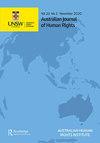Deprivation of liberty on distant water fishing fleets: a new impetus for the OPCAT monitoring?
Q1 Arts and Humanities
引用次数: 0
Abstract
ABSTRACT Detention monitoring under the Optional Protocol to the UN Convention against Torture is today broadly considered as covering a plethora of non-traditional places, including but not limited to various care facilities, institutions for children or migrant shelters. The COVID-19 pandemic has further shown that there is an abundance of public health measures that likely involve a deprivation of personal liberty. In addition to the challenges brought by the world’s pandemic, there remain primordial man-made ‘illnesses’ such as workers’ exploitation, forced labour, slavery and trafficking in person that likewise concerns deprivation of liberty and ill-treatment. This is especially true for documented prison-like conditions on distant water fishing fleets where workers are confined to the physical boundaries of the ship and could not leave the terrible conditions to which they are often subjected. Therefore, a question has emerged as to what elements constitute the ‘place of detention’ under the Optional Protocol and what is the extent of detention monitoring? Examining the use of the OPCAT on the specific situation of ill-treatment on Taiwan fishing fleets is believed to put some flash to the ongoing discussion and clarify further the monitoring mandate of the National Preventive Mechanism.剥夺远洋捕鱼船队的自由:《禁止酷刑公约》监测工作的新动力?
《联合国禁止酷刑公约任择议定书》下的拘留监测目前被广泛认为涵盖了大量非传统场所,包括但不限于各种护理设施、儿童机构或移民庇护所。2019冠状病毒病大流行进一步表明,有大量公共卫生措施可能涉及剥夺人身自由。除了世界大流行病带来的挑战之外,仍然存在着人为的原始"疾病",如剥削工人、强迫劳动、奴役和贩运人口,同样涉及剥夺自由和虐待。这对于记录在案的远洋捕鱼船队类似监狱的条件尤其如此,那里的工人被限制在船上的物理边界内,无法离开他们经常遭受的可怕条件。因此,出现了一个问题,即根据《任择议定书》哪些要素构成“拘留地点”,拘留监测的范围是什么?审查《任择议定书》对台湾渔船遭受虐待的具体情况的使用,据信可以为正在进行的讨论提供一些线索,并进一步澄清国家预防机制的监测任务。
本文章由计算机程序翻译,如有差异,请以英文原文为准。
求助全文
约1分钟内获得全文
求助全文
来源期刊

Australian Journal of Human Rights
Arts and Humanities-History
CiteScore
1.30
自引率
0.00%
发文量
43
期刊介绍:
The Australian Journal of Human Rights (AJHR) is Australia’s first peer reviewed journal devoted exclusively to human rights development in Australia, the Asia-Pacific region and internationally. The journal aims to raise awareness of human rights issues in Australia and the Asia-Pacific region by providing a forum for scholarship and discussion. The AJHR examines legal aspects of human rights, along with associated philosophical, historical, economic and political considerations, across a range of issues, including aboriginal ownership of land, racial discrimination and vilification, human rights in the criminal justice system, children’s rights, homelessness, immigration, asylum and detention, corporate accountability, disability standards and free speech.
 求助内容:
求助内容: 应助结果提醒方式:
应助结果提醒方式:


